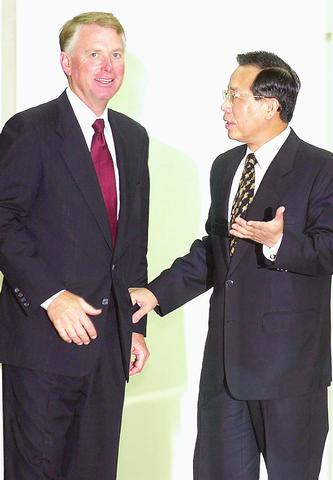Former US vice president Dan Quayle is visiting Taiwan as a consultant to Cerberus Capital Management, an investment firm interested in setting up an asset management company locally.
Quayle met Minister of Finance Yen Ching-chang (
"Because Quayle is currently involved ... in an asset management corporation, he took the opportunity to understand regulations [regarding such companies] in our financial institutions merger law," Yen said shortly after an hour-long closed-door meeting.

PHOTO: GEORGE TSORNG, TAIPEI TIMES
According to Yen, Bruno had expressed interest in setting up an asset management company in Taiwan sometime in the near future.
The government is wooing international investment banks to set up asset management companies in joint venture with domestic firms to help clean up the nation's higher number of non-performing loans.
The Financial Institutions Merger Law, which was passed last Friday, is expected to aid the financial sector's restructuring.
Leading banks are seen as interested in coming to Taiwan to set up asset management corporations.
Quayle, however, declined to comment on the exact nature of his visit. The main purpose of this visit, he said, was to "see some friends in Taiwan and to have some good conversations with the president this afternoon."
Quayle met with President Chen Shui-bian (
He also met with the leaders of Shinkong Group yesterday and is expected to meet with the representatives of the Koo's Group and KMT chairman Lien Chan (
Stanley Kao (
Jackson is director of Asian Studies at Paul H. Nitze School of Advanced International Studies at John Hopkins University.
While Quayle is not expected to take up a government post, his influence may grow if George W. Bush wins the final vote tally in Florida. Quayle, 53, served as US vice president under former president George Bush from 1989 to 1992. The Bush-Quayle team lost their re-election bid in 1992 to the current Clinton-Gore administration.
Meanwhile, Quayle declined to make any specific comments on the US election. "I am not here talk about the support of recount, but to learn more about Taiwan," he said.
"I am delighted to be back here by my fourth visit of Taiwan, obviously at a rather historic time when the American presidency was still somewhat in limbo."
Quayle, however, said there is "no crisis" in the system. "We have a president, Bill Clinton, and we'll get on with the nation's business in due course."

TAKING STOCK: A Taiwanese cookware firm in Vietnam urged customers to assess inventory or place orders early so shipments can reach the US while tariffs are paused Taiwanese businesses in Vietnam are exploring alternatives after the White House imposed a 46 percent import duty on Vietnamese goods, following US President Donald Trump’s announcement of “reciprocal” tariffs on the US’ trading partners. Lo Shih-liang (羅世良), chairman of Brico Industry Co (裕茂工業), a Taiwanese company that manufactures cast iron cookware and stove components in Vietnam, said that more than 40 percent of his business was tied to the US market, describing the constant US policy shifts as an emotional roller coaster. “I work during the day and stay up all night watching the news. I’ve been following US news until 3am

Six years ago, LVMH’s billionaire CEO Bernard Arnault and US President Donald Trump cut the blue ribbon on a factory in rural Texas that would make designer handbags for Louis Vuitton, one of the world’s best-known luxury brands. However, since the high-profile opening, the factory has faced a host of problems limiting production, 11 former Louis Vuitton employees said. The site has consistently ranked among the worst-performing for Louis Vuitton globally, “significantly” underperforming other facilities, said three former Louis Vuitton workers and a senior industry source, who cited internal rankings shared with staff. The plant’s problems — which have not

TARIFF CONCERNS: The chipmaker cited global uncertainty from US tariffs and a weakening economic outlook, but said its Singapore expansion remains on track Vanguard International Semiconductor Corp (世界先進), a foundry service provider specializing in producing power management and display driver chips, yesterday withdrew its full-year revenue projection of moderate growth for this year, as escalating US tariff tensions raised uncertainty and concern about a potential economic recession. The Hsinchu-based chipmaker in February said revenues this year would grow mildly from last year based on improving supply chain inventory levels and market demand. At the time, it also anticipated gradual quarter revenue growth. However, the US’ sweeping tariff policy has upended the industry’s supply chains and weakened economic prospects for the world economy, it said. “Now

COLLABORATION: Given Taiwan’s key position in global supply chains, the US firm is discussing strategies with local partners and clients to deal with global uncertainties Advanced Micro Devices Inc (AMD) yesterday said it is meeting with local ecosystem partners, including Taiwan Semiconductor Manufacturing Co (TSMC, 台積電), to discuss strategies, including long-term manufacturing, to navigate uncertainties such as US tariffs, as Taiwan occupies an important position in global supply chains. AMD chief executive officer Lisa Su (蘇姿丰) told reporters that Taiwan is an important part of the chip designer’s ecosystem and she is discussing with partners and customers in Taiwan to forge strong collaborations on different areas during this critical period. AMD has just become the first artificial-intelligence (AI) server chip customer of TSMC to utilize its advanced